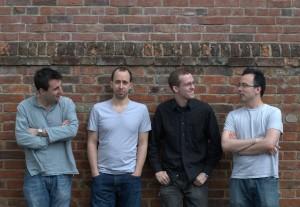Search
REVIEW: The Convergence Quartet, Cambridge, Churchill College Recital Room, Wednesday 9 November 2011

The Convergence Quartet has been making regular visits to Cambridge over the past few years, and, even if the names of its individual members may not be immediately familiar to the audiences to which it plays here, their pedigree should, really, speak for itself. Cornetist Taylor Ho Bynum, for instance, has worked with two of the giants of post-war ‘free jazz’, as a member of poet-pianist-composer Cecil Taylor’s big bands, and, more crucially, as one of composer-theorist-saxophonist Anthony Braxton’s key recent collaborators. Currently, he is co-leading a big band which promises, among other genre-bending moments, a Latin music version of texts by Joseph Conrad. Bassist Dominic Lash and pianist Alexander Hawkins have both been features of the UK improvised music scene for a good few years now – this tour marked Lash’s welcome return from a six-month sojourn in New York City, while Hawkins has gigged, both at home and internationally, with such leading lights as drummer Louis Moholo-Moholo, saxophonists Joe McPhee and Evan Parker, and vibes player Mulatu Atsake, of ‘Broken Flowers’ fame. Harris Eisenstadt, meanwhile, is that rare beast, a drummer who also doubles as a fine composer, and has made numerous recordings with his own groups, the latest of which, ‘September Trio’, has just been released by Clean Feed.
Such a by-the-numbers summary may provide an overly prosaic and even dull intro to what was a sparkling and enlivening gig: nonetheless, perhaps it helps to suggest some of the varied cross-connections and influences that make the music of this British-Canadian-American group such a rich and multi-faceted thing. While each player is clearly technically adept, unleashing passages of almost casual virtuosity that no doubt had the jazz-heads in the audiences nodding their heads or tapping their feet in rapture, what’s particularly striking is the way that the group functions as a group, a unit, in which, for instance, more than one player will appear to be taking a solo at the same time. This is not the ecstatic discord of pure free jazz, however: the group tread a fine line between ‘inside’ and ‘outside’, their music based on near-constant shifts and turns, dips and dives – between ‘head’ and improvisation; between the multiple sections of complex compositions; and between varied, sometimes simultaneous emotional connotations. So this might be characterised as a twenty-first- century music, drawing, in a contemporary manner, on the whole scope of jazz history in a manner of which the post-bop throw-backs who dominate today’s jazz mainstream could only dream.
The music the quartet play is almost entirely original – all are fine composers, with no need to rely on the same old standards that have been de-constructed and re-configured endlessly for the past half-century and more – ranging from Lash’s tricky ‘Oat Row’, which emerged as a series of stately muted statements in duo with Bynum, to the latter’s new piece based on a text from David Mitchell’s novel ‘Cloud Atlas’, a straight-forward concluding blues, and – perhaps the highlight of the entire concert – an absorbing fifteen-minute medley of tunes by various members of the group. Sometimes, one gets the feeling that jazz bands are playing new tunes because they feel they have to stake their claim as leaders or originals – even if these tunes are singularly un-original or thread-bare. In this case, however, the compositions provide a framework for and around improvisation, rather than merely existing as a necessary evil, sketchy ‘heads’ to be quickly negotiated before the proper business of a ‘blowing session’ can begin. They are strategies which facilitate coming together, not in a manner that yields homogeneous pap, but rather, achieving unity through diversity, difference and change.
One might consider the band’s name here: the word ‘converge’, denoting ‘the coming together of at least two things’, derives from the Latin root, ‘convergere’, ‘to incline together’ (‘con’ meaning ‘together’, ‘vergere’, ‘to bend, turn, or incline’). All these phrases suggest fine parallels for the way the quartet works: multiple influences, interests, geographical backgrounds, coming together to form a music whose cohesiveness and sheer skill doesn’t detract in the slightest from its raw excitement and carefully managed, bundled-up energy – or energies, plural, harnessed and released, drawn back and then let fly again in intricate and beautifully involving kind of choreography. The group’s convergence is not an imposed, impersonal system, but a result of the accommodation of each player’s inclination, their leaning towards or away from some harmonic, melodic, stylistic suggestion, from where their next improvised phrase might take them – leaning, like a ‘lean-to’, a provisional structure which can house several people under one roof, but which could be re-configured, taken down and put back up in some other, entirely different location. In concrete terms, then, each player’s vocabulary is deep and wide, drawing from as far back as the 1920s – Bynum’s delightful plunger-muted growls and vocalised wails: bluesy, gritty and heart-breaking in turn – through Hawkins’ occasional nods to Bud Powell, Thelonious Monk and Cecil Taylor (incorporated into a piano style which prevents such disparate references from coming off as mere pastiche, as post-modern patchwork), through Lash’s walking or droning arco bass, through Eistenstadt’s Tony Williams-esque insistence on providing dramatic and melodic accompaniment to the front-line, fully participant in the music’s ongoing argument, rather than merely keeping time or chug-a-lugging in the background so that the star soloists can have their say in the spotlight. Formally complex, and yet fully capable of either straight-down gut-punch or a more guarded, wryly morphing emotionalism –let’s say, Bynum’s plunger-muted parody of a crooner, or his whispered wistfulness on ‘Third Convergence; Hawkins’ exhilarating switches between finger-flying single-note lines, or his sudden, elbow-jabbed cluster chords (just barely held in check) – The Convergence Quartet is no doubt one of the finest ‘jazz’ bands around, certainly in the UK, at this moment. We were lucky to have them here in Cambridge.
Writer: David Grundy
10 November 2011